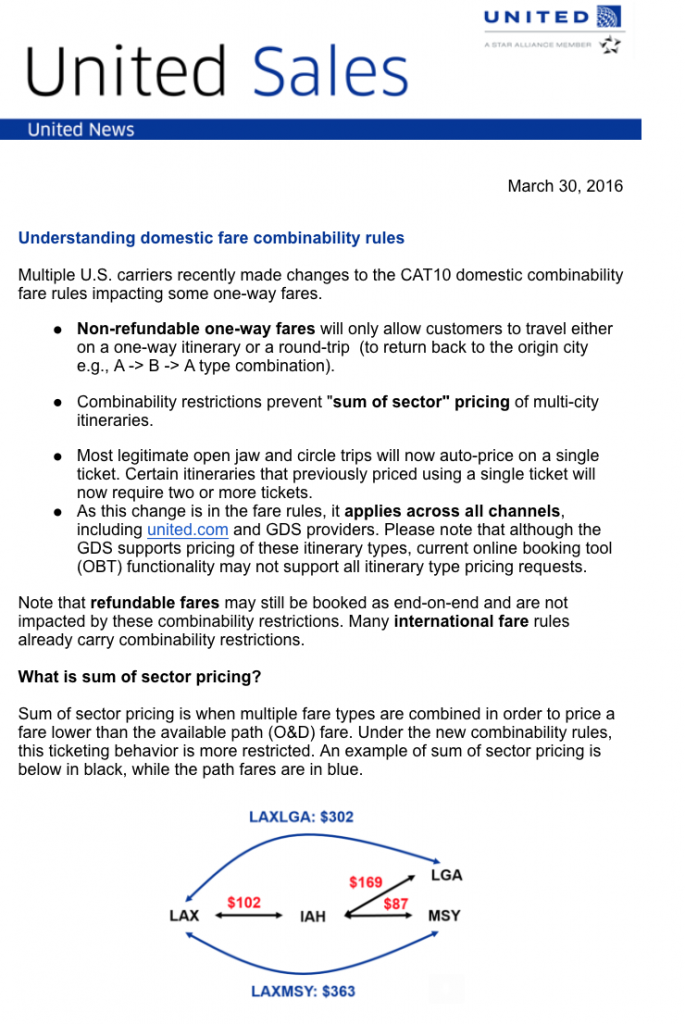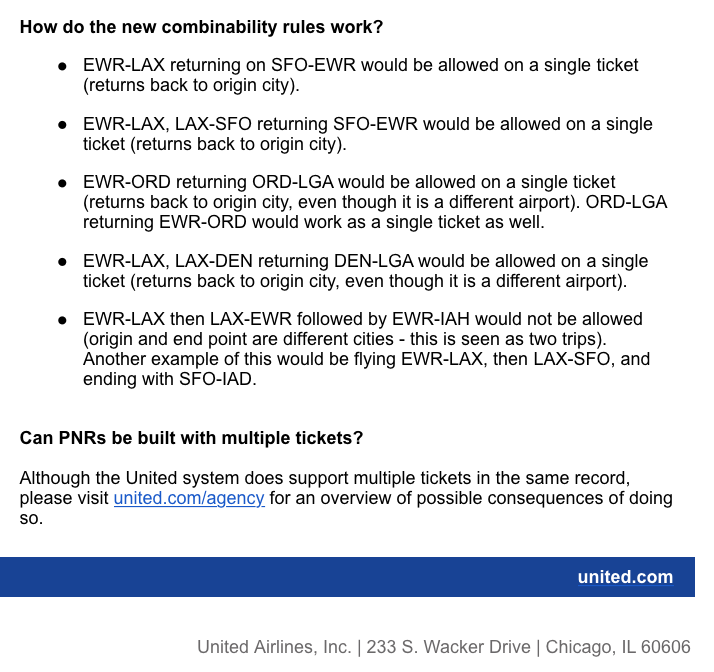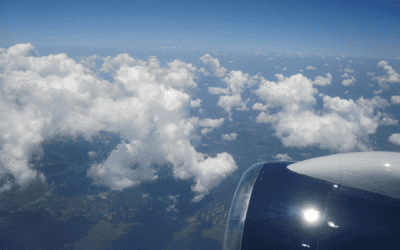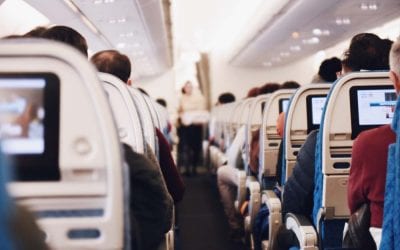In a post last week I wrote about changes United Airlines had quietly made to fare combinability rules. It was a rather archaic rule change to those not in the travel industry, but one that would result in higher fares for many travelers on multi-city trips. And later, when American and Delta followed, it seems to be airline collusion.
Here is an example:
A travel agent asks the United computer reservation system for the cheapest fare from San Francisco to Washington to Denver to Bozeman to Denver to San Francisco. The computer churns and says the cheapest airfare for that route is $$2,272.20.
If a travel agent priced the ticket out as a series of one-way tickets it looks like this:
San Francisco to Washington to Denver to Bozeman the airfare prices out at $554.20.
Bozeman to Denver to San Francisco prices at $426.60.
Total for the same trip as above is only $980.80.
This example is taken directly from a travel agency screen. It shows the carrier returning a “cheapest airfare” that costs $1,291.40 more than purchasing two separate tickets.
Now, one MIGHT think that with fuel costs so low lately, United might not feel quite the need for fare games to get higher prices. Well, yeah, we can dream. The rest of the Big 3 — American and Delta — evidently are doing the same thing. Funny how these airlines never collude but seem to change their rates and rules all within moments of each other. It sure looks like airline collusion.
An addendum to these changes came in an email from United to travel agents. And it came in the first line.
“Multiple U.S. carriers recently made changes to the CAT10 domestic combinability fare rules impacting some one-way fares.”
“Multiple,” as in all the U.S. legacy carriers, United, American and Delta.
I understand that airlines can quickly see each other’s fares and change them to match on a moment’s notice. But this is a much more subtle and insidious match. The fare changes are so complicated that most of the reservations agents I talked to didn’t understand them. And, some United agents initially thought it was a mistake in the computer systems.
Finally, United felt compelled to send out a long email from their sales office to travel agents with explanations of the new rules. But, even I, as a long-time travel agent, had to read carefully more than once to understand the exact logic and rules. To be quite honest, I am still not quite sure I get all the nuances. (Part of that email is shown at the bottom of this story.)
Basically airlines are tightening the rules for itineraries that are not simple roundtrips. We’ll still have to double-check itineraries to see if they are affected and whether or not we, as travel agents, need to issue multiple tickets.
United said, for now, reservations systems will allow travel agents to issue multiple tickets for a single itinerary, although they warned about all the things that could go wrong.
Our agency, operating near a United hub, didn’t get a similar memo from American or Delta, which made the same rule changes, but presumably agencies who sell more American and Delta got or will get similar emails.
So, how did all the carriers just happen to make the same complicated changes at the same time? Only a form of collusion can be the explanation. If they aren’t a monopoly, they are at least an oligarchy. This is not the way it’s supposed to be.
We often wink at the idea that airlines don’t act as one when they match each other’s fares within seemingly seconds. And, in extreme cases, sometimes individuals can end up thinking alike in weird ways. Once, in high school, a trigonometry teacher called a friend and I to her desk, saying she had wondered if we were copying from each other, because we were using similar but odd logic on some problems. As she said, “I’ve been watching you both carefully for a while. You aren’t cheating, but I can’t figure out how either of your minds work.”
In this latest case of seeming airline collusion among American, Delta and United, I can’t figure out how airline minds work, either. But this doesn’t seem like weird logic. It is simply cheating.
The flying public is the group being harmed by this airline collusion. It is time for DOT to take a stand and call this kind of coordinated action what it is and put a stop to these kinds of airline shenanigans.
In communications with various Senate and House member’s offices, Travelers United has learned that a group letter is being readied to be sent to the Department of Transportation to call for an end to this kind of deceptive and misleading anticompetitive airfare-biasing practice.
Janice Hough is a California-based travel agent a travel blogger and a part-time comedy writer. A frequent flier herself, she’s been doing battle with airlines, hotels, and other travel companies for over three decades. Besides writing for Travelers United, Janice has a humor blog at Leftcoastsportsbabe.com (Warning, the political and sports humor therein does not represent the views of anyone but herself.)






